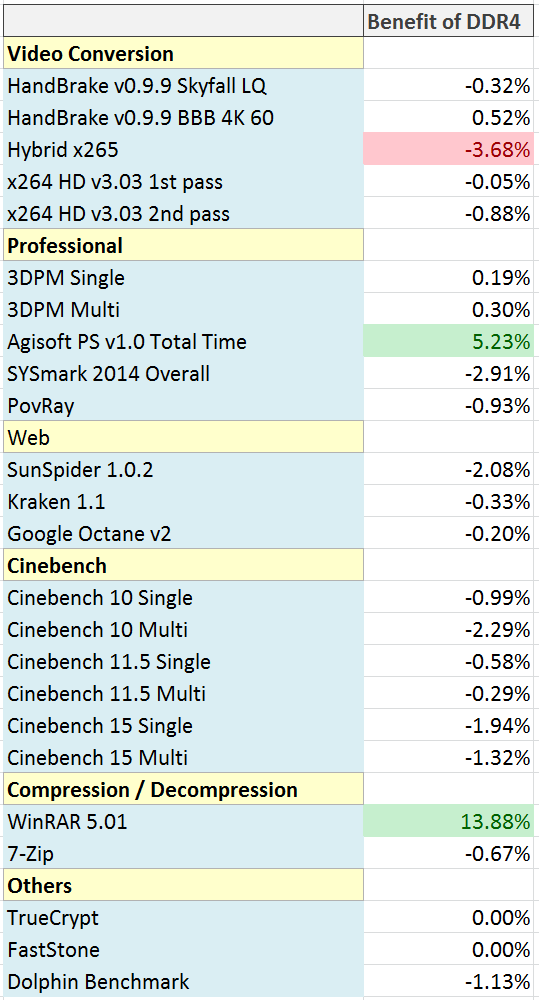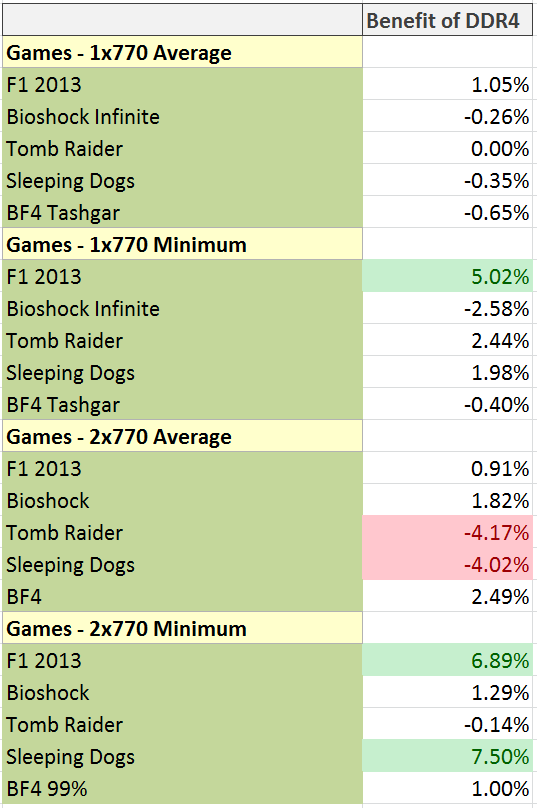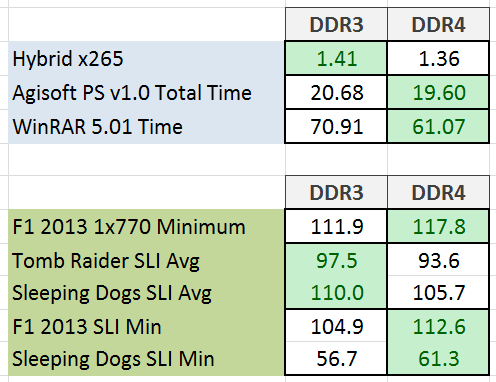DDR4 Haswell-E Scaling Review: 2133 to 3200 with G.Skill, Corsair, ADATA and Crucial
by Ian Cutress on February 5, 2015 10:10 AM ESTComparing DDR3 to DDR4
Moving from a standard DDR3-2133 C11 kit to DDR4-2133 C15, just by looking at the numbers, feels like a downgrade despite what the rest of the system is. Ideally we want the first number, the frequency, to be high and the second number, the latency, to be low. After spending several years dealing with DDR3, moving to DDR4 feels a bit of a backwards step when you look at solely the numbers on paper.
As part of this review we have covered many different areas where DDR4 is the upgrade of DDR3, not only in terms of voltage but some of the underlying concepts as well. This puts DDR4 in a position for upgradability in the future, especially when it comes to density and future technologies (see the next page for more information). But an ultimate question still remains: at the same frequency and latency, do they perform the same?
The only way to perform an identical comparison would be to have a platform that could probe both DDR3 and DDR4 while keeping the same CPU. If one comes along, we will test that, but in the mean time we can do some broad comparisons with near-identical systems.
For this test we took two Haswell based systems and compared them against each other. The first contains the Haswell-E i7-5960X processor, cut it down to run at four cores with no HyperThreading, fixed the CPU speed at 4 GHz and placed the memory into DDR4-2133 14-14-14 350 2T timings. We did the same with the second system, a Haswell based i7-4770K moved it to 4 GHz and making sure it was in 4C/4T mode. The OS was placed into a unique high performance profile and we ran our test suite. The only difference that remained between the two setups was the L2 and L3 cache, which we cannot change unfortunately.
In our non-gaming tests, there is one situation where DDR3 is more than 3% better and two where DDR4 is +3%. It is worth noting that most of the numbers, especially with things like the Web and Cinebench are actually slightly negative.
In the gaming tests, similarly there are more +3% on the side of DDR4. If we do a direct comparison regardless of the percentage, DDR4 wins 11 times compared to DDR3 getting 8, and almost of DDR3’s wins are minor except for two-way SLI. It would seem that for two-way SLI DDR4 at least brings up some of the minimum frame rates.
Pulling out the >3% difference numbers, just to see what the numbers exactly are:
On the face of it, the Hybrid result does not seem that different, whereas a full minute on Photoscan or 10 seconds in our WinRAR test feels like a difference. In the gaming tests moving nearer to 120 FPS or 60 FPS, especially in both of the minimum frame rate tests, is an important jump which happens with DDR4.
Overall, comparing DDR4 to DDR3, there is little difference to separate the two. In a couple of small instances one is better than the other, but on those edge cases it might be prudent to say that we cannot make a final decision until we can synchronize the rest of the system, such as the size of CPU caches. When we can perform such tests, we will run some more numbers.













120 Comments
View All Comments
JlHADJOE - Thursday, February 5, 2015 - link
Will be interesting to see another article like this when we have CPUs with integrated graphics and DDR4.OrphanageExplosion - Thursday, February 5, 2015 - link
"For any user interested in performance, memory speed is an important part of the equation when it comes to building your next system."Doesn't your article actually disprove your initial statement?
And surely your gaming benchmarks might make more sense if - once again - you actually tested CPU intensive titles as opposed to the titles you've tested? The GPU will barely touch your expensive DDR4, if at all.
The only scenario I can see DDR4 making a real difference will be in graphics work with AMD APUs, and even then we'll need to see really high-end, fast kits that should just about offer comparable bandwidth with the slowest GDDR5 to offer a literally game-changing improvement.
Sushisamurai - Thursday, February 5, 2015 - link
Errr... Memory speed did make a difference (small IMO) when it came to DDR3. This article tests if it holds true to DDR4 - however, without an iGPU the other tests don't really show a significant difference when price is factored in. I mean, sure, there's a difference, but not worth the price premium IMO.A future AMD comparison would be nice, when AMD decides to support DDR4... Otherwise, it was a nice article.
FlushedBubblyJock - Sunday, February 15, 2015 - link
That's called the "justify wasting my life to write this article, tag and hook and sinker line, plus the required tokus kissing to the kind manu's that handed over their top tier for some "free" advertising and getting out the word.It's not like the poor bleary eyed tester can say: " I didn't want to do this because one percent difference is just not worth it, my name is not K1ngP1n and I'm not getting 77 free personal jet flights this year to go screw around in nations all over the world.
vgobbo - Thursday, February 5, 2015 - link
I really enjoyed this review!But... Intel processors are massive cache beasts, which reduces a lot the pressure put on memory (except for games, which I believe was the most interesting part of this review). Said that, I wish to see a review on an AMD system, which have a lot weaker cache structure and memory buses.
Is this possible to happen, or I'm just a dreamer? ;D
Anyway, this was another outstanding review of Anandtech! Loved it! Thank u guys!
dazelord - Thursday, February 5, 2015 - link
Interesting, but isn't Haswell-E/X99 accessing the memory in 256bit mode using 4 dimms? I suspect the gains would be much more substantial in 128bit/ 2 dimm systems.willis936 - Thursday, February 5, 2015 - link
Good stuff but after seeing a fair bit of memory roundups in my time I think this mostly confirms what everyone has been thinking: DDR4 is incredibly underwhelming in the performance space. You not only get better bang for buck with DDR3 right now but comparable, if not better, performance in the high end kits.galta - Thursday, February 5, 2015 - link
You've got it wrong. Nobody goes for DDR4 because of the memory, it's because of the new CPU and chipset.Ask yourself: do you really need extra cores and/or pci lanes? Or, do you want them and have the money to pay for it? If the answer is "yes" than you'll go for 5xxx and DDR4 is incidental.
Otherwise, go 4xxx and DDR3 will also be incidental.
It makes no sense to talk about memory as if it could be chosen independently from CPU/chipset.
rmh26 - Thursday, February 5, 2015 - link
Ian could you post more information about the NPB fluid dynamics benchmark. Specifically which benchmark CG, EP, FT ... and which class problem S, W, A, ...etc. In my own research I have found the simulation time to scale nearly linearly with the memory frequency for large enough problems. I am wondering how much the cache has to do with masking the effects of memory frequency on performance. As a the size of the problem gets larger the cache will no longer be able to mask the slowness of the memory. In general memory, and moreover interconnects between computers play a very important role in some HPC applications the rely on solving partial differential equations. In fact there have been suggestions to move away from the standard HPC Linpack benchmark used to create the top 500 lists as this compute intensive benchmark does not accurately reflect the load placed on supercomputers.http://insidehpc.com/2013/07/replacing-linpack-jac...
Dasa2 - Thursday, February 5, 2015 - link
Congrats anandtech you screwed up another ram review further misleading peopleThe games you chose to review are so badly GPU bottlenecked its sad. Do you not know that ram performance affects cpu performance?
You could run Dirt 3 with a i3 2100 vs a 5ghz 5960x and get the same score
How about putting some different CPU in amongst your ram benchmarks like 4460-4690 5820-5960x so people can see how faster ram compares to spending more on the CPU...
A 4690k with 1600c11 ram can perform slower in games than a 2500k with 2133c9 ram